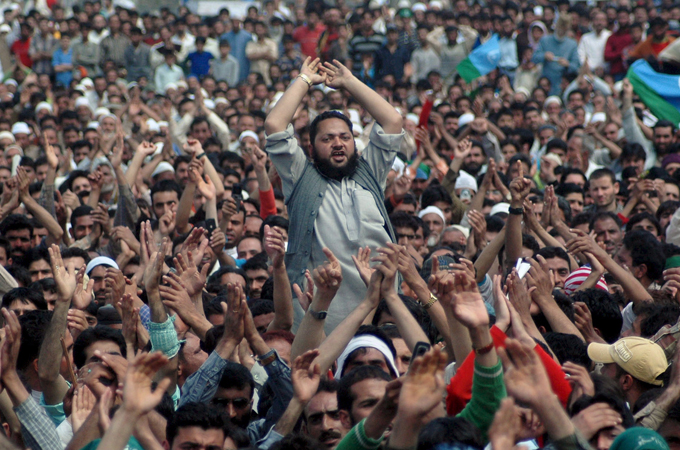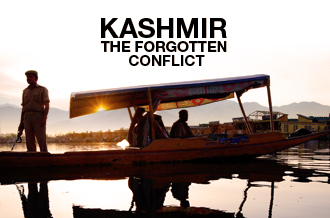From Kashmir to K Street
Recent ISI lobbying scandal regarding Kashmir is overshadowing the real issue at hand.

 |
| Kashmiri Muslims shout during a rally in support of separatist leader Syed Ali Shah Geelani in Srinagar [EPA] |
This time last summer, 118 teenage protesters, including an eight-year-old, were being murdered by state security forces in Kashmir, a disputed territory contested between nuclear rivals India and Pakistan. Bullets were shot for stones thrown. Having just returned from Kashmir a few weeks ago, I was made aware of the fatigue and mistrust that permeates the streets of Kashmir today, given the lack of support its civil society receives from the world community.
A week after my return to the United States, in every world news headline, a new news story had already out-done the media’s coverage of the deaths and mass protests by Kashmiri civil society last summer. Be it in DC’s K Street or the parliament in New Delhi, within the valley of broken promises, Kashmiris continue to endure suffering while an indifferent world overlooks.
ISI involvement
The headline drawing the attention this week: Dr Fai, director of the Kashmiri-American Council (KAC), has been accused by the FBI of receiving some $4 million in funds from the Pakistani intelligence service, ISI, in an effort to influence US policymakers on Kashmir. For any Kashmiri that knew him, Dr Fai was dedicated to the well-being of Kashmiris and worked tirelessly on the issue when few did. Yet, with any violation of US law, especially with regards to funding from government agencies as duplicitous as the ISI, legal action should be quick and unrestrained.
This is a rare instance in which, indirectly, the Pakistani ISI is connected to monetarily seeking to influence policies on Capitol Hill.
‘Pakphobia’
|
As the parasite of “Pakphobia” embeds itself in the media’s identification of Kashmir, key issues remain overlooked with respect to Kashmiris’ grievances and the United States’ navigation through South Asia’s troubled politics.
The unfortunate allegations against the KAC risk being exploited as an opportunity to marginalise the overall grievances of Hindus, Muslims, and Sikhs in Kashmir. Kashmiris are not supportive of extremist groups, nor any secret agencies – be they Indian or Pakistani. The only victims from this current scandal of alleged corruption in DC are the Kashmiri people, who, for decades have been abused by state security forces, the double dealings of Pakistan’s military apparatus, and now the failed leadership from within its own community – both in Srinagar and in DC.
The political and military games in South Asia between India and Pakistan openly play themselves out via a proxy, in this case a US Congress informed by lobbying groups on K Street instead of the civil society of Kashmir. Groups such as the Indian “US-Inpac” battle against its rival Pakistani group “Pal-C” for leverage on the Hill. If used properly, the Foreign Agents Registration Act, FARA, essentially enables foreign governments to influence legislation favouring a particular policy or business interest by hiring lobbying groups, most of which are located on DC’s K street.
Examples of this have include Turkey, which hired lobbyists to stop a resolution on Capitol Hill aimed at identifying genocide in Armenia. Morocco spent some $3.5 billion on lobbying the issue of the Western Sahara. Of course, these countries do so legally. While the allegations against Dr Fai and the KAC violating FARA are surprising, it is not surprising to hear the Pakistan ISI may have been investing in agents to tilt the US towards greater involvement in Kashmir.
As Pakistan’s efforts on Kashmir remain rooted in suspicion, Indian lobbyists and India’s military and intelligence establishment have successfully occupied Kashmir and portrayed to the international community and Capitol Hill that it is an internal problem, fuelled by anti-Indian extremist groups from Pakistan.
India has strategically asserted itself as the emerging economic and politically influential leader of South Asia. Pragmatically, the US has never had a tilt towards Kashmir and will remain hedging its bets in the region with India.
Indian influence
The Indian lobby is galvanised by several key diplomatic victories in the past decade, namely pushing through the Civil Nuclear Agreement between India and the US. The Indian embassy signed contracts with two DC lobbying firms, BGR and Venable, for approximately $700,000 and $600,000 respectively. BGR’s president was former US Ambassador to India, Robert Blackwill.
In 2008, Indian lobbyists, businessmen, and diplomats, successfully prevented the Obama administration from adding India to Special Envoy Richard Holbrooke’s mandate. In a report about the power of the Indian lobby in the US, the Delhi-based Caravan reported that: “After what several people describe as an intensive lobbying campaign, the Obama administration announced that Holbrooke’s scope would not include India.” Including India in the mandate would have meant third party dialogue on Kashmir.
Pakistan, in its obsessive efforts to handicap India’s political and security influence, always mobilised against India on the issue of Kashmir and rights abuses there. In the decades-long conflict, Pakistan has supported and funded groups such as Lashkar-e Taiba, whose very creation was to build momentum for armed revolt in Indian-administered Kashmir as a hit against India.
Still acting as an ISI insurance policy for an “indocentric” security policy, groups such as Lashkar today have emerged within Pakistan with the capacity to mobilise thousands of vulnerable youth towards jihad against US efforts in Afghanistan. They hold Pakistan’s civilian government hostage with the threat of mobilising the public against the US-Pakistani security relationship as a justifiable reason to destabilise the Pakistani government through violence.
Stephen Tankel of the Carnegie Middle East Center writes: “A complex and powerful organisation that rose to prominence with Pakistani state support, Lashkar has sent scores of fighters to Iraq and Afghanistan and provides them with essential strategic and tactical help. Lashkar was formed by men with years of training in the trenches of Kashmir, and its skill in executing efficient and effective insurgencies has made the organisation extremely attractive to dissidents.”
From the Afghan-Pakistani border to India and Pakistan’s LoC, Lashkar and like minded groups today risk sabotaging any US, Indian, and Pakistani efforts for regional peace and stability. Kashmir, therefore, has and always will be a central issue in strategising regional peace and cooperation in South Asia. This fact is one that the US cannot afford to ignore, given that, historically, events in Afghanistan and Pakistan have always bled into Kashmir, further destabilising the region. The upcoming troop draw down in Afghanistan will most certainly impact security developments in Kashmir and India in the coming years.
What to do?
Members of the US Congress would be well advised to not completely defer developments in Kashmir to India out of fear of being associated with the recent Dr Fai-ISI scandal. The data that speaks to Kashmiris’ hardships remains in the dark. With more than 500,000 Indian military and paramilitary forces and some 300 militants remaining in the valley, gross human rights abuses continues to be committed on the people of Kashmir. In the future, this may potentially erode any local trust in political participation and civil society development. In the aftermath of the 1990s, 70,000 have been killed, tens of thousands have been victim to torture, and between 6,000-8,000 Kashmiris remain victims of enforced disappearances. Both militants and the state are to blame.
Inferring that a single man, religious community, organisation, or nation represents the Kashmir conflict, is both false and dangerous. If US economic and security interests in the region are to evolve positively, members of congress will inevitably have to cease their policy of listening to K Street while closing their eyes to the K issue.
A generation of youth have now grown up in an embattled Kashmir during the 1990s, but today there is emerging an active, peaceful civil society seeking greater human rights, accountability and space. This is an opportunity. For this to be nurtured and to progress peacefully, the non-violent efforts of Kashmiri civil society must inevitably be supported and encouraged by leaders in the world community – independent of Pakistan’s ISI, India’s RAW, or K street’s lobbying firms. Only then will the grievances of Kashmiris be properly addressed by a rising global power such as India.
Mohsin Mohi Ud Din, a Fulbright Scholar Alum, is a Kashmiri American who works on issues related to Muslim-Western Relations and governance in South Asia, the Middle East and North Africa. Mohsin just returned from Kashmir after two months of humanitarian and cultural diplomacy work in Indian Administered Kashmir.
The views expressed in this article are the author’s own and do not necessarily reflect Al Jazeera’s editorial policy.
